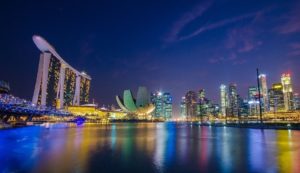Blog
Around the World: Traveling to Find Your Dream Career

March 9, 2022
In the third episode of “Alariss Classroom”, Eric Stinehart (Princeton University, Class of 2020) and Chelsea Li (Yale University, M.A. IDE 2018) talk about traveling and living in different countries, experiencing various cultures and discovering their career preferences along the way.
Hi everyone. You’re listening to Alariss Classroom. Today, we have two amazing guests to join us, Eric Stinehart and Chelsea Li. Let me read a bio for both of them. Eric just graduated from Princeton Class of 2020 and is from Chicago. He concentrated in international development in the School of Public and International Affairs and received a certificate in African studies and French language and culture. Chelsea Li is currently a consultant for the World Bank Jakarta office. She did her bachelor’s degree at the London School of Economics and then a master’s degree in international and development economics at Yale University. She has previously worked and studied in the US, UK, Thailand, and Singapore. Welcome, both of you, to join us today. I really appreciate that you guys would like to spend some time with me today and also share your previous life experience and travel experience. Why don’t you guys say hi to our audience today and introduce more about yourself?
Eric: Hi everyone, thank you so much for having us, Camilla. I’m really excited to be here. I guess just a little bit more background about me. I’m from Chicago, but my mother is from Shanghai, China, and my dad is from Iowa, actually, America, so that was a really interesting thing I would say, to grow up with. I would also say that my college experience, while I did study at Princeton and graduate from there, it was very international. I actually had two study abroad experiences, for two semesters, in Paris at Sciences Po as well as England at the University of Oxford. I also had two international internships while I was in college, in South Africa and in Israel as well. I also did my senior thesis research during my senior year in Ethiopia. So that’s been a really important part of me in terms of all these international experiences. Outside of school, other things I like to do include figure skating and playing the viola and dancing. Thanks so much for having us.
Chelsea: Hi everyone, I’m very honored to be on this podcast today. For me, I’m Singaporean, but I wasn’t born in Singapore. I was actually born in China, and I migrated to Singapore when I was 7 years old with my parents. So that Chinese identity has always been a big part of me. And the first time when I really lived abroad was when I went to LSE for my bachelor’s. So over there, in the UK, I traveled quite extensively in Europe, just because flights are so cheap and it’s so accessible. So I spent three years in the UK, in Europe, and then after that, to the US. The US was an entirely new experience as well. And I feel like school demographics-wise, the US was much more diverse. There were just so many international students, so I had a great time because of that. And after that, I worked in Southeast Asia for a while. I’m still here. But many go into Thailand, Indonesia, and Singapore. So that kind of regional perspective has also been quite interesting because Southeast Asia is kind of seen as a whole rather than individual countries because each country is so small and kind of insignificant. That’s why people label it as SEA or Southeast Asia.
Thanks a lot for letting us know about your educational background and your travel background. And also, talking about travel, I would say the latest time I went to travel is this March, I went to Denmark, so I spent around 5-6 days in Copenhagen. Even before the trip, I had some stereotypes, for somebody like me who had never been to Europe or Copenhagen, I keep thinking Copenhagen is going to be cold and I don’t really get the culture, because from the food culture, I always think they don’t do hot meals, they kind of have a super-ego, because they keep thinking of Norway or other parts of Europe are parts of this culture thing. Maybe this is a question from me to both of you. Before you travel to so many places, do you guys have any pre-stereotypes for anything? It could be culture, it could be food, or even history.
Eric: Yeah, I can start this off. So I would say, actually Chelsea and I were talking a little bit about this beforehand, and we really try to, with all of our travels, to go into places with an open mind. I definitely try to do that myself, and to try not to go in with too many preconceived notions. But I think one interesting thing to think about for me would be my last travel experience, my last international one, was to Addis Ababa, Ethiopia, as I mentioned, for doing research for my senior thesis, which was about Chinese manufacturing investment in Africa, in specifically Ethiopia and Nigeria. I think there are a lot of things we can talk about, there are some stereotypes of traveling to Africa. When I went there, I didn’t see many tourists, I definitely didn’t see many Westerners. So there are stereotypes, but not a lot of people are going there to debunk these stereotypes. So I think that’s an interesting thing. But I think what’s more interesting for me was thinking about how people would view me. So I remember when I was in South Africa, there would be a lot of people who might think that I’m Japanese, some thought I was Chinese. They would say certain things. It was interesting because in Ethiopia, one thing that I just did not realize, and I think it just depends on when you go there, it depends on how people view you, but everyone thought I was Chinese and from China because the biggest international influence in recent years has been from China. So in fact, on the street, people were trying to sell things, they would even say things in Chinese. They would always say, “Sine G, sine G,” which is like 3G, selling you data for your phone. So I thought that was really interesting, as a half-Asian, it’s always interesting to be viewed somewhere else as perhaps full Asian, and more than that, from China, whereas that might not be the case. If I’m in China, people might definitely think I look different, maybe I’m from somewhere else, maybe I’m half. And in America it’s different as well. So I think it’s always interesting to see how different histories and influences can influence how people see different people, and for me, just how people see me where I go. So I thought that was pretty interesting.
Yeah. This is really interesting. I’ve never been to Africa, and I definitely didn’t experience something like that. Chelsea, do you have any answers for stereotypes for travel?
Chelsea: Yeah, sure. So I actually don’t have that many stereotypes for myself, but I’m going to talk about how my parents felt when they went to Europe for my graduation, because it was their first time in Europe, and for people of their generation, their view of Europe is always it’s really posh and really modern and really advanced, and I think my parents’ jaws really dropped when they went to Europe and realized that actually, they are really dilapidated places, the train stations are so dirty, and when you’re in the tube, it’s so hot, and especially when they went over, it was summer, they were just like, how can this be possible, because they’re so used to being in a cushioned environment in Singapore where everything is so well provided for. So they got a huge shock when they went over to Europe to discover that actually, it’s not like everything is so perfect and rosy as everyone said about Western countries. Because that’s how the perspective or the narrative has always been for them. They were comparing how Asia is progressing so rapidly to these countries. They’re just like, I don’t think I’m going to come back to Europe because Asia is so much better. Look at all the technology, look at how well we’re provided for, and then environment-wise. So that was something really interesting to me, because from my perspective, I really like Europe for the arts and culture stuff, and also the way they leave the attitude and stuff. But for people of the older generation, those things might not be very important, but what they focus on is more the comfort and how modern the society is. So that was a really interesting perspective, I realized, for different generations, how people might perceive different countries differently because of that.
Eric: That’s so interesting that you say that, Chelsea. Just a quick comment. I have a lot of international friends who definitely say this about America, whether it’s even about New York, the subway system is really old, not as efficient as a lot of other places in the world, or about most of the Midwestern states, in a lot of ways, seemingly being less developed than you might think. So it’s very interesting.
Yeah, I definitely have some relation with this whole story. I grew up in China, born and raised there. Before I moved to the States, New York is a typical place for the United States. And when you’re talking about New York and the graph in your mind is a lot of buildings, and between the buildings, you can see a little bit of the Brooklyn Bridge, and you see the yellow cab. And you can see, OK, that’s an international, big city. But the first time I went to New York, I was really surprised. It was mid-August, it was really hot, and the whole city didn’t smell that good. So I was so surprised with it. And I said, OK, I guess it wasn’t what I expected in New York because I was definitely thinking New York is more like Beijing or Shanghai. All those stereotypes make you think it is like where you grew up. But actually when you’ve been there, it will change what you thought. I always think, everybody always having a stereotype with a lot of things going on, but without you going there, without you really testing things out, it will keep the stereotype in your mind no matter what. Talking about that, I know both of you are well traveled to a lot of places. Do you guys ever have some emotional difficulty? Or I should say more, share with us a little bit your emotional journey before you prepare travel, and when you travel there, and after travel, what is your emotional change? How will the emotion affect your travel?
Chelsea: Maybe I go first. So I’ll be talking about my solo trips. I quite enjoy doing solo trips. And the very first time I did it, I went to Budapest. It was really nerve-wracking because even though Budapest is really safe, being alone, by yourself, not knowing anyone in that city is quite scary. So I still remember so vividly the feelings I had when I was on that plane, I was like, Oh my God, the plane is going to take off, and this is the last moment that I’ll be in London, because the next moment I’m going to be in the air and I’m going to be reaching a city where I absolutely know no one from there. So that was actually quite scary, the part of it, but then after I reached, I went to a hostel, and people were so nice, and kind of meet people from other countries as well. I met a bunch of Americans, and they were really warm towards me. I guess people hosting in hostels are generally really open to making friends anyway, so that was actually a pretty good experience. I even have some of them on Facebook right now, to catch up now and then. So it actually wasn’t as scary as I thought it would be. It was fine for me to venture on the streets by myself, even at night. I thought it might not have been very safe, but actually, after I landed, I was like, actually this feels OK, like I’m completely open towards it. I had dinners by myself and just walked along the river and just enjoying day trips all by myself. I think solo traveling really gives you the space to be at ease with yourself and really absorb everything happening around you because there is no one else to distract you from that experience and that moment in time. You’re fully immersed in that experience. That’s what I really like about solo traveling. And also because you’re entirely at the helm of things and you can decide where exactly I want to go, how do I want to spend my time. That part I really like. So I would say it’s rather fulfilling and I guess whatever fears I had at the start of the journey, they were long gone at the end of it. Which is why I keep doing it again and again. Of course there are cities I wouldn’t feel safe in, so I would do a little bit of research before I decide on a place, if it’s a place that might not be as safe, I would probably still go with a friend.
Eric: I completely agree with everything that Chelsea said. I don’t have too much to add on that respect. Honestly I had a very similar experience. For me, it was Madrid, my first real solo travel experience. Also had a great time going to a hostel and meeting lots of different people from all over, which really calmed me down. So a very similar experience. One quick thing I could mention as well that’s a little bit different would be the emotional and mental experience not just of traveling, but especially if you’re living somewhere and you make your own life there and you make your own routine and schedule. There was a period of a few months, it was my sophomore spring, I was studying abroad in Paris, and then that summer, I was doing an internship in Tel Aviv, Israel, and then right after that, I went to study abroad again in Oxford, England. And from those three places, I spent a few months in each, and all three were amazing in and of themselves. The abrupt uprooting of my life from one place to the next, with a completely different routine, different life, different friends, different food, different everything, and I loved all of that, right. But I realized I actually didn’t have much time to go back home and process all those things. And actually, at the end, it was really exhausting, and I didn’t realize how much, it had taken a little bit of a mental and emotional toll on me. I was glad I was able to go home after that and then spend a long time, I had a long winter break because of the schedule of school in England, and just to really sit and think about and reflect on all of my experiences. Because I think that’s also an important thing to remember, is while you’re in a travel or new living experience, it’s so great and fun, but it can also take time to really adjust and process all of that, especially when you come back.
Yeah, definitely. And I guess after you’re talking about those, from your emotional level, and my next question I would be asking. What was the most memorable place where you traveled or you have been living at? I just wonder, why, and why you think those places are most memorable or the place you most enjoyed there?
Eric: I can start off. For me, I think I would say Tel Aviv, Israel…one other thing that you guys would agree with me, it’s often not as much about the specific place, the food, or anything. It’s about the people. The people you meet there, the new people you meet, or the friends. And in Tel Aviv, maybe partially it’s the culture, but I also happened to meet a lot of different people. I was on an internship through Princeton, so there’s Princeton students there, as well as many local people that I met just randomly through one way or another. I made just a lot of really great friends there, and I just remember going to the beautiful beach in the water, which is a great temperature there. I think the water is way too cold in Lake Michigan near Chicago, but it’s great temperature there. And just hang out with my friends and feeling at peace in life and really loving the experience. I think that remembering those day-to-day moments with a lot of the people that I became really close to with that summer was just really memorable for me.
Chelsea: For me, the most memorable place I’ve ever lived in is probably Thailand, because it was my first time living in a place where I didn’t know the language. Before that, I’ve lived in China, Singapore, the US, and the UK. So I’m bilingual and have no problems communicating when I’m actually there. But going to Thailand was a whole new world because there’s just no way I can communicate with locals because they have very limited knowledge of English and Chinese, so it was a bit of a shock. And as Eric mentioned earlier, it usually takes you some time to get assimilated into an environment. Like first week…you’re seeing who’s around you, the kind of language that you’re hearing. Because everything is going to be so far and it’s all going to come to you at once, especially because I was also doing a UN internship at the same time, so it was a new job as well. So everything was new, and it was really quite tough. I felt a lot of pressure to get myself out of my hotel room and really go and find friends. But it was really difficult because all the interns were so preoccupied. Everyone was mingling and really trying to maximize their time over there in Thailand, while I felt I needed time to digest everything by myself first before pushing myself out there and stuffing my schedule as much as possible. I think I needed to find my inner peace. Thailand was really memorable because of the language barriers and the difficulties I had to go through in terms of getting around, learning to live by myself in a foreign country where I have absolutely no idea of the language there, and having no network as well, just building a social network completely from scratch. Because before that, I’ve always relied on schools, and once you have school, you have that automatic network set up, but now it’s entirely new. But I guess what helped was Thai people are really nice, like they’re known for the land of smiles, so everyone is super friendly and super nice. So actually, even though I say that language is a barrier, it was actually not much of a problem as well because people just tell you so much truth through smiles. And once they smile at you, you’re just like, Aww, it just melts my heart, and I know that you’re really genuinely nice to me. Because I think you can tell from someone’s smile whether they’re genuine or not. I make friends with my hotel concierge or the roadside store, aunty who was selling noodles, this sort of stuff. I don’t know their names, but I definitely can recognize them when I go back. Just because of those genuine interactions that we had despite all the language barriers.
Yeah, definitely. Both of you guys are currently having a really amazing career right now. I wonder, how did travel affect your current career choice? Did any of the travel really affect it?
Chelsea: I’ll go first. For me, toward the end I was getting a bit tired of moving around. Because I’ve stayed at a few different countries, and it was getting a bit tiring, because I can never buy heavy stuff or put things on my walls permanently, and I really kind of craved the feeling of being able to settle down somewhere, and making these places actually my house. I rented, and I know I have to vacate in a certain time frame. That’s why I came back to Singapore, and I was really glad to have my own room. I don’t have to care what I put on my walls. Even if I buy a TV, then it’s going to stay there forever, it’s not like I have to sell it in a year’s time or something. So it was my decision to come back home. But at the same time, because of my travels, I saw a lot of things, and I know that I really want a global career. So I don’t want my job to be restricted to just Singapore. And that’s why I started to look out for other opportunities as well, that’s why I’m now working for the World Bank in Jakarta remotely. So actually, I started remote work way before the coronavirus started. It was quite interesting. Even though I’m not in Indonesia, I fly over occasionally for trips, but actually working with an office that is not in your country gives you that global perspective as well because you need to communicate with all the stakeholders who are based in Indonesia, understand the realities that they are facing, the cultural context and everything. So it brings out an interesting point, you might not have to be physically in the country to experience a different culture, because nowadays technology is so advanced. As Eric said, a lot of the times it’s the people that matter. When I interact with Indonesian colleagues, I kind of know this is how an Indonesian acts like, this is how they address certain people, they will say Puck, blah blah blah, Puck, is like a very formal address to address Indonesian people. And these kinds of cultural norms you can get when you talk to young colleagues. So you might not need to be physically traveling in order to overthrow some of the stereotypes that you have or learn about a new culture, because nowadays the reality has changed so much, especially during the age of the coronavirus.
Eric: Great. And for me, perhaps I’ve not gotten to the point where Chelsea is, but for now, I do want to travel more. Travel and living in different places in the past has just made me want to travel more and really instilled in me a wanderlust that I just won’t be able to shake off, at least not for a while. I don’t see myself completely settling down right now, and I still do want to meet new people, make new friends, have new experiences, and really grow and challenge myself in that way. And I would say it’s also made me really open to different paths and different perspectives. One important one was speaking of kind of back to the hostel for me in Madrid, I met a lot of people who were just traveling and they didn’t know what their plans were and they were just traveling until their bank account ran out, basically. I was like wow, I never thought about living like that, and there’s nothing right or wrong about it, just a different way of living life. People are going to be much more free and open-minded, they don’t know if they’re going to be in this country or that country tomorrow or what their next career plan is. I think it’s made me realize, I’m generally someone who tries to plan a lot of things out, there’s a different very valid perspective, it’s made me realize that a little bit more, that maybe I don’t need to be doing that as much. And even more concretely, in South Africa, I was doing an internship on financial inclusion…that made me feel very motivated, and I realized that I want to do more socially mission-driven work in the future. In Tel Aviv, I was working at a startup, in the startup scene, that made me realize how exciting startups were. So there are different experiences in the past, while I’ve been traveling and living abroad, that have really influenced my career choices in the future as well as life perspectives, I would say.
Yeah, definitely. I mean, today we really spent a lot of time talking about travel, talking about the emotions, and talking about the cultural experience. So I guess the last question that I have for both of you is, if you can pick anywhere in this world, where would be the best place, or where would be the place that you want to work and live?
Chelsea: For me, it would be China. For two main reasons. The first reason is because, as I mentioned at the very start, I was born there and I lived there until I was 7 years old. Basically my foundation years were spent there. And I’ve always had this affinity with China. When I went back to travel, I felt that I could actually belong there. I don’t feel like China Chinese, but I do feel like I can mix in really easily. I can speak perfect Chinese, I don’t think I really stand out as a foreigner, just being able to integrate into the life there. That would be pretty amazing. The second reason is I think China is progressing a lot. When I went to China, I was so taken aback, impressed by the whole technology revolution and how digitization happened, because I really just had to take out my phone and use WeChat Pay for everything, like you don’t have to bring out anything else. And back here in Singapore, people are having such a hard time trying to push the whole nation to go cashless because people are so reliant on cash and there is this inertia to actually move away from cash and go cashless, even move to cards, credit cards. It’s a bit of an issue because elderly people just really want to stay in cash… So China is really impressive in that way because the whole nation’s attitude is really different and people are so open to changes. People are so forward-looking and they harbor so much hope for the country and for themselves. I feel like when you’re actually there, you feel really motivated too because everyone is working so hard at their own lives and the whole country is just progressing so rapidly. I feel like if I’m part of it, I will probably get part of the whole movement.
Eric: I kind of hate to get my answer, but it’s that I don’t know. I don’t know where I want to work and live in the future. If I did, I’d probably hopefully be there now. But it’s interesting that Chelsea also brought up the point of inclusion. Just for me, in the US, especially over the last few months, in addition to other things as well, in some ways I feel less and less included or that I belong here or that this is where I should be or am supposed to be, I’m feeling a little bit less of that, and I don’t know where that will be in the future. Honestly because of a lot of similar things to what Chelsea said, I am interested in China as well, especially in Shanghai, which I realized for me is somewhere that I had family there, I went there over the summers pretty often growing up, but I’ve never had my own life there and my own community and my own sense of self there. But it makes it so that it’s somewhere I want to spend a significant amount of time in the future. I don’t know if that’s where I ultimately want to live and work. As I mentioned, Tel Aviv was really an amazing summer there, so part of me wants to go back and see if the magic would still hold if I live there for life, but I don’t know. I still have more exploring to do, and it’s going to be a process, but I’m excited to still be on that journey.
Yeah, definitely. Life is definitely a lot of unknowns. You don’t know what’s going to happen next, you don’t know where is your final destination, I definitely believe in that. I’m really glad both of you spent this time with me today, and I hope our audience will enjoy our conversation today. Once again, thank you so much for having this precious time with me today. Thank you.
Eric: Thank you.
Chelsea: Thank you so much. Bye.





